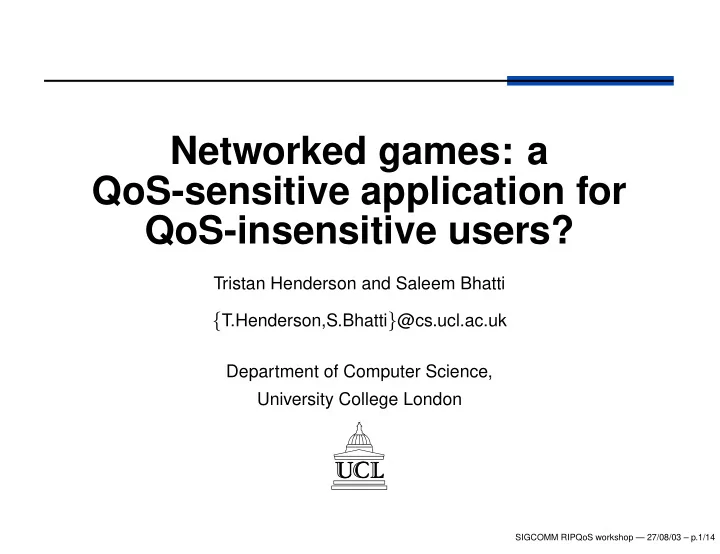

Networked games: a QoS-sensitive application for QoS-insensitive users? Tristan Henderson and Saleem Bhatti { T.Henderson,S.Bhatti } @cs.ucl.ac.uk Department of Computer Science, University College London SIGCOMM RIPQoS workshop — 27/08/03 – p.1/14
Introduction Why do we care about QoS? Apparently QoS is a requirement for next-gen networks There are lots of applications that require QoS What are these applications? Multimedia conferencing? Not that popular. . . (but Apple, AOL?) VOIP? Reasonably popular. . . Networked games? Very popular But where’s the QoS? SIGCOMM RIPQoS workshop — 27/08/03 – p.2/14
Outline Games —QoS requirements Our experiments —methodology Results What next? Discussion SIGCOMM RIPQoS workshop — 27/08/03 – p.3/14
Games Ever popular — Spacewar (1969) was networked Some market research (don’t forget the salt): $1.5bn revenue / year (total games market = $11bn) 114 million players by 2006 55 million “casual” players Three main genres: FPS — Half-Life , Quake , Doom MMORPG — Everquest , Star Wars: Galaxies RTS — Civilization , Age of Empires Typically client-server, UDP Delay is most important QoS parameter SIGCOMM RIPQoS workshop — 27/08/03 – p.4/14
Requirements for games Delay is most important QoS parameter: Human factors 200ms requirement for interaction DIS 100-300ms for simulations VR studies interaction difficult ≥ 225ms Game studies 100ms for racing games around 150-250ms for FPS 150ms for MiMaze SIGCOMM RIPQoS workshop — 27/08/03 – p.5/14
Experiments Do players care about QoS? Can they notice? We can find out. . . Set up some public game servers Alter the QoS (delay) See what happens How does delay affect: Joining a server —are players dissuaded? Leaving a server —are players annoyed enough to leave? SIGCOMM RIPQoS workshop — 27/08/03 – p.6/14
Methodology GAME SERVERS DELAY GENERATOR Two popular public Half-Life game servers One Linux gateway for adding delay SIGCOMM RIPQoS workshop — 27/08/03 – p.7/14
Joining a server Session membership 25 server1 server2 20 15 Players 10 5 0 16/06 17/06 18/06 19/06 20/06 21/06 Time With no additional delay, both servers are similar. . . SIGCOMM RIPQoS workshop — 27/08/03 – p.8/14
Joining a server (2) Session membership 25 server1 server2 20 15 Players 10 5 0 01/05 02/05 03/05 04/05 05/05 06/05 07/05 08/05 Time Add some delay and people go away. . . 50ms seems to be enough to deter SIGCOMM RIPQoS workshop — 27/08/03 – p.9/14
Leaving a server Add random amount of delay to all players on server Add up to 250ms, i.e. 2 × “tolerable” amount Players who leave tend to have higher delay Delay affects performance of players (kills/min) Amount of extra delay (as a %) has no significant effect Regular players no less likely to leave Duration has an effect —players who have played longer less likely to leave SIGCOMM RIPQoS workshop — 27/08/03 – p.10/14
Leaving a server (2) Does “relative delay” (player’s delay relative to others) have an effect? Add delay to a subset of players on the server Seems to have little effect Even though relative differences in delay have an effect on performance Time again has an effect —players who didn’t leave in event of additional delay had been playing longer SIGCOMM RIPQoS workshop — 27/08/03 – p.11/14
"Conclusions" How important is QoS for game players? Controlled experiments indicate players can notice 150ms and don’t like 250ms It appears they tolerate much more in the “real world” Might QoS requirements change over time? Utility of application is not static over time Can ISPs exploit this? Pricing/charging for QoS Surveys indicate players unwilling to pay for QoS If can’t notice QoS, they will be even less willing to pay. . . SIGCOMM RIPQoS workshop — 27/08/03 – p.12/14
Future work Further experiments Other QoS parameters Other strategies for annoying players Different games driving, MMORPG etc. Different environments Mobile Modelling time-variant QoS Cooperative users versus non-cooperative ISPs SIGCOMM RIPQoS workshop — 27/08/03 – p.13/14
Discussion What applications require end-user QoS? Is choosing a QoS level an appropriate end-user decision? Will we ever see end-user QoS pricing? What will it look like? Are users too accustomed to a free best-effort service? Napster → no-one is paying for music Console users, MMORPGs Should ISPs fool customers? Is dynamic QoS desirable/feasible? Will users pay for it? SIGCOMM RIPQoS workshop — 27/08/03 – p.14/14
Recommend
More recommend